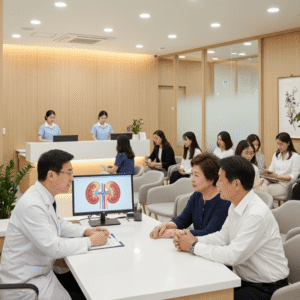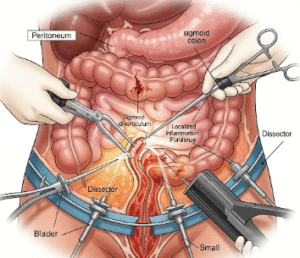What it is
Endometrial cancer is a malignancy that starts in the lining of the uterus (endometrium). It is the most common gynecologic cancer in developed countries and is often diagnosed at an early stage because it typically presents with abnormal uterine bleeding.
Endometrial cancer treatment involves a combination of surgery, radiation, chemotherapy, hormone therapy, and targeted treatments, depending on the stage and type of cancer. In Korea, treatment is highly advanced, coordinated by multidisciplinary oncology teams that personalize care for each patient.
➡️ Key facts about endometrial cancer treatment:
- Surgery (usually hysterectomy) is the primary treatment in most cases
- Advanced or recurrent cancers may require radiation, chemotherapy, or targeted therapy
- Fertility-preserving options available for younger women with early disease
Why it’s done
Endometrial cancer can progress if left untreated, spreading to nearby organs and lymph nodes. Early, well-coordinated treatment ensures the best survival outcomes and quality of life.
✔️ Medical reasons for treatment include:
- Abnormal vaginal bleeding (most common symptom)
- Pelvic pain or pressure
- Cancer diagnosis confirmed by biopsy
- Preventing progression or recurrence
✔️ Benefits of treatment:
- High cure rates when detected early
- Multiple treatment options tailored to stage and patient needs
- Fertility-sparing treatments available for young women
- Long-term monitoring and holistic support provided in Korea
Alternatives
While treatment is essential, different options may be used depending on stage, patient preference, and fertility goals.
🔹 Surgery (mainstay treatment):
- Total hysterectomy with bilateral salpingo-oophorectomy (removal of uterus, ovaries, and fallopian tubes)
- Lymph node dissection to check for spread
🔹 Hormonal therapy:
- For younger women who wish to preserve fertility
- Uses progestins (oral, injectable, or IUD-based) to control tumor growth
🔹 Radiation therapy:
- External beam or vaginal brachytherapy
- Used when surgery is not possible or as an additional therapy after surgery
🔹 Chemotherapy:
- Drugs like paclitaxel and carboplatin for advanced stages
- Often combined with radiation
🔹 Targeted therapy and immunotherapy:
- Newer treatments available in advanced cancer centers in Korea
- Focused on genetic and molecular cancer profiles
Preparation
Preparation ensures effective treatment planning and safe procedures.
➡️ Medical preparation:
- Endometrial biopsy for diagnosis
- Imaging tests (MRI, CT, PET scans) to determine cancer stage
- Blood tests including CA-125 for advanced cases
- Anesthesia evaluation before surgery
➡️ Personal preparation:
- Discussing fertility goals with doctors
- Preparing for possible surgical recovery and time off work
- Family involvement in decision-making
➡️ Mental preparation:
- Understanding treatment options and potential side effects
- Counseling for anxiety, fear, or fertility concerns
- Emotional readiness for a long-term monitoring plan
How it’s done
Endometrial cancer treatment in Korea is modern, precise, and multidisciplinary.
✔️ Step 1 – Surgery
- Laparoscopic or robotic hysterectomy preferred for minimal scarring and faster recovery
- Ovaries and fallopian tubes usually removed unless fertility-sparing option chosen
- Lymph nodes examined for cancer spread
✔️ Step 2 – Radiation therapy
- External beam radiation therapy (EBRT): Targets pelvis to kill residual cancer cells
- Brachytherapy: Radioactive device placed inside vagina for localized treatment
✔️ Step 3 – Chemotherapy
- Used for advanced, recurrent, or high-risk cancers
- Often combined with radiation for better outcomes
✔️ Step 4 – Hormone therapy
- For young women or those not eligible for surgery
- Progestin therapy with oral pills or intrauterine devices
✔️ Step 5 – Targeted therapy and immunotherapy
- Treatments like pembrolizumab (immunotherapy) and molecular targeted drugs available in specialized Korean cancer centers
- Personalized based on genetic cancer testing
✔️ Duration:
- Surgery: 2–3 hours with hospital stay of 3–5 days
- Radiation/chemotherapy: weeks to months depending on cycles
- Long-term follow-up: every 3–6 months for 5 years
Recovery
Recovery varies depending on treatment method but is generally well-supported in Korea.
➡️ Immediate recovery:
- Post-surgery: mild abdominal pain, fatigue, and temporary urinary/bowel changes
- Post-radiation/chemotherapy: nausea, fatigue, hair loss, or skin irritation
➡️ Physical recovery:
- Return to daily activities in 2–6 weeks after surgery
- Side effects from radiation/chemo managed with supportive care
- Long-term lifestyle changes encouraged (diet, exercise, stress reduction)
➡️ Emotional recovery:
- Relief from effective treatment often mixed with anxiety about recurrence
- Counseling and support groups widely available in Korean hospitals
- Fertility concerns addressed with reproductive specialists
➡️ Key recommendations:
- Follow-up checkups every 3–6 months
- Maintain healthy weight and active lifestyle to reduce recurrence risk
- Seek psychological support if struggling with anxiety or body changes
Treatment option in Korea
Korea is globally recognized for its advanced gynecologic oncology programs.
✔️ Hospital facilities:
- National Cancer Centers and university hospitals with specialized women’s oncology units
- Robotic-assisted surgery and precision radiation available
- Integrated care centers providing screening, treatment, and rehabilitation
✔️ Medical expertise:
- Multidisciplinary tumor boards for each case
- Surgeons skilled in fertility-preserving and minimally invasive techniques
- Access to latest clinical trials and immunotherapies
✔️ Post-treatment care:
- Structured long-term follow-up plans
- Rehabilitation programs including pelvic therapy and nutrition counseling
- Emotional and psychological support services
✔️ Cultural aspect:
- Korean healthcare emphasizes privacy, family involvement, and holistic recovery
- Patients often benefit from Sanhujoriwon-style recovery centers, adapted for cancer patients with nutrition, rest, and counseling
➡️ Highlight: Endometrial cancer treatment in Korea offers advanced surgical precision, fertility-conscious approaches, cutting-edge therapies, and holistic patient care, ensuring women receive world-class treatment and long-term support.













